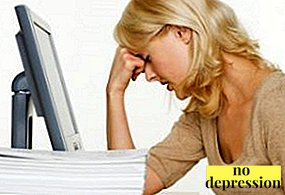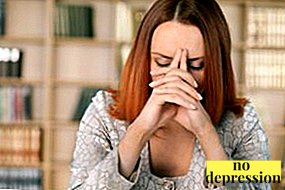Anxiety is familiar to everyone.
In the modern world cause for concern is more than enough: stress at work, problems in family relationships, academic failure, health problems.
But it also happens that everything in life is good, and anxiety arises for no apparent reason.
Can anxiety arise without reason?

According to the World Health Organization, almost every third person in the world throughout life faced with gratuitous anxiety.
At the same time, 5-8% of the population of the Earth was diagnosed with “generalized anxiety disorder”. In psychiatry, this disease was isolated separately not long ago - in 1980.
People suffering for them are characterized by a prolonged anxiety, non-event specific in life.
At the same time, there is often an inexplicable fear of illness or accident, a person is worried about himself and his loved ones, he cannot get rid of bad forebodings.
What is causeless fear? The psychologist tells:
Secret nature
If the causes of ordinary concern are real problemsoccurring in life, the factors leading to anxiety disorder are not so obvious.
Psychiatrists have not yet fully investigated this disease and can not give an exact answer, what exactly provokes its appearance. However, there are certain risk factors:
 Genetic predisposition. Most mental disorders are hereditary. Generalized anxiety disorder is no exception. For those people whose relatives have suffered from this pathology, the probability of encountering it increases.
Genetic predisposition. Most mental disorders are hereditary. Generalized anxiety disorder is no exception. For those people whose relatives have suffered from this pathology, the probability of encountering it increases.- Stress. Each person has a different level of resistance to emotional overload. Some people, under the influence of prolonged stress, lose the ability to recover, and the anxiety becomes chronic.
- Psychological trauma. Unreasonable anxiety disorder often develops in people who have been mentally or physically abused.
- Biochemical causes. In the human brain, there are neurotransmitter substances that provide communication between neurons. They contain GABA inhibitory peptide, which increases anxiety.
- Female. It is known that women are more often anxious than men. The diagnosis of “generalized anxiety disorder” for the fair sex is twice as common.
- Psychoactive substance use (alcohol, drugs, tobacco, caffeine).
With an abnormal increase in the amount of this peptide, the usual anxiety develops into a mental illness.
Symptoms of causeless anxiety

Unreasonable anxiety manifests itself both psychological and physiological symptoms.
Among them are the following:
- Fear, unreasonable excitement about future events, a premonition of failure, premature prediction of an unfavorable outcome. This may be the expectation of an unpleasant conversation, late arrival, poor evaluation of the work performed.
- Anxiety for their own health and the health of loved ones, the fear of death.
- Exaggeration of real problems. Even minor life difficulties lead to a state of stupor, a person does not feel the strength to cope with them.
- Obsessive desire to control the situation, find out how events will develop in the future.
- Excessive irritability, irritability.
- Increased fatigue, difficulty concentrating.
- Insomnia.
- Motor tension. A person is fussy, shakes all over his body, cannot relax his muscles.
- Headaches.
- Tachycardia.
- Sweating
- Nausea.
 Stomach upset.
Stomach upset.- Dizziness.
- Dry mouth, not caused by medication, dehydration, or other diseases.
- Rapid breathing or asthma.
How to distinguish from generalized disorder?
The most important sign to suspect the presence of generalized anxiety disorder, is the lack of an objective reason for excitement.
Faced with a feeling of anxiety, you must first carefully analyze the events of your life, ordinary fear will always have a specific source.
There is a test for matching psychological symptoms to a diagnosis of “generalized anxiety disorder.” Required rate on a scale from 0 to 3 points recent manifestation of the following symptoms:
- nervousness, anxiety, mental state "on the verge of collapse";
- inability to take the alarm under control;
- strong anxiety on various occasions;
- difficulty relaxing;
- restlessness;
- irritability or incontinence;
- anticipation of negative events.
14 or more points may indicate a disease.

In addition, you need to pay attention to the physical condition.
The presence of at least three physiological symptoms suggests that anxiety went beyond the ordinary and developed into a mental disorder.
If you suspect a generalized anxiety disorder better to seek help from a psychotherapist and undergo a full medical examination.
Accurate laboratory tests that identify mental abnormalities do not exist. Therefore, the doctor will first of all exclude possible physical diseases that have similar symptoms (diabetes mellitus, hypertension, disorders of the gastrointestinal tract, the thyroid gland).
The diagnosis will be made only if the state of anxiety is present for a long time - from six months or longer.
Generalized anxiety disorder - symptoms:
How to treat panic attacks?

With slightly pronounced symptoms of anxiety disorder, treatment may take place. without the use of drug therapy.
Conversations with a psychologist or psychotherapist will help to cope with causeless fear.
Same good result show techniques of muscle relaxation, abdominal breathing, auto-training.
Sudden, uncontrollable attack Anxiety is called "panic attack." In this case, the physiological symptoms are so pronounced that the patient suspects a heart attack or stroke.
When repeating panic attacks or in the case when the symptoms of anxiety disorder reach such strength that they prevent a person from leading a normal life, affect his professional qualities, it is necessary to use medications.
For the treatment of this disease, psychiatrists prescribe anxiolytics and antidepressants. Benzodiazepine tranquilizers, such as Diazepam and Lorazepam, are very effective. So that the patient does not form a dependency, these drugs prescribed short courses.
Among the antidepressants in the treatment of generalized anxiety disorder, serotonin and noradrenaline reuptake inhibitors (Sertralin, Fluoxetine, Duloxetine, Escitalopram, Pregabalin) are the most effective.
These drugs are prescribed in a small dosage, but have a cumulative effect, so the treatment takes a long time.
Panic attack. Fear for no reason. How to treat:
Prevention

Modern man is facing too much stressTherefore, the prevention of causeless anxiety is relevant for everyone.
First of all, it is necessary to exclude the effects of psychotropic substances, to refrain from alcohol, smoking, to limit coffee consumption.
In general, a healthy lifestyle, light physical exertion, a balanced diet always beneficially affects the state of mind. It helps to deal with anxiety. yoga and meditation.
In the case of severe psychological trauma should not neglect the services of psychologists. Continuing anxiety, anxiety, waiting for trouble can ruin the life of any person.
In order not to lose the joy of life, you need to be attentive to your inner state, keep a close eye on physical signalsthat our body feeds. Unreasonable fears have their roots and to cope with them fully possible.

 Genetic predisposition. Most mental disorders are hereditary. Generalized anxiety disorder is no exception. For those people whose relatives have suffered from this pathology, the probability of encountering it increases.
Genetic predisposition. Most mental disorders are hereditary. Generalized anxiety disorder is no exception. For those people whose relatives have suffered from this pathology, the probability of encountering it increases. Stomach upset.
Stomach upset.

